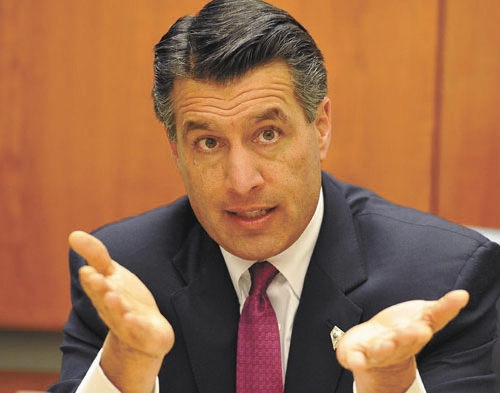Sandoval’s Medicaid choice praised, but concerns remain
It's not the perfect fix, but it's a start.
That's the consensus among medical professionals on Gov. Brian Sandoval's decision to opt into the federal Medicaid expansion initiative, which will make 78,000 uninsured Nevadans eligible for the low-income insurance program.
From doctors' groups to hospitals, providers said Wednesday that bringing more Nevadans into Medicaid and boosting the program's reimbursements on primary care by 36 percent will increase access to health care and bring the system needed efficiency and predictability. But they agreed that Nevada's under-doctored system would continue to struggle to provide care, and the maze of red tape that entangles health coverage won't abate.
"This doesn't alleviate the need for (Sandoval) and the Legislature to really look at improving compensation in the Medicaid program," said Larry Matheis, executive director of the Nevada State Medical Association, an advocacy group for doctors.
"There's underpayment to a level where some doctors can't afford to take more than a minimum number of Medicaid patients, and it's a problem that's going to be there with or without expansion or a payment boost for primary care providers. And with the (Silver State insurance) exchange, private insurance and Medicare, the system will be no less complex, and maybe will be more expensive in some ways."
So why did the medical association urge Sandoval to sign off on expansion?
Because more coverage means protocols to help patients use health care more efficiently, Matheis said. As with private insurers, Medicaid is experimenting with case-management programs that prevent unnecessary emergency room visits and "make sure patients are entering the health care system in the right place," he said.
Ensuring patients know where to seek initial care would ease the financial burden on hospitals, industry officials said.
Consider Sunrise Hospital and Medical Center and Sunrise Children's Hospital. Southern Nevada's uninsured flock to emergency rooms for primary care, said Todd Sklamberg, CEO of Sunrise and Sunrise Children's. The two hospitals provided care for 4,000 uninsured patients in 2011, and their level of uncompensated care has jumped 14 percent in 2012, Sklamberg said.
With Medicaid expansion, Sklamberg said he expects a "small drop" in uncompensated care, but it's a small drop that could make a big difference in the long run, he said.
"This is a very significant step in the right direction," Sklamberg said. "It's only a first step in Medicaid reform, but it's the most critical step."
Unpaid care is an urgent issue at University Medical Center. The Clark County-owned hospital provides about $250 million a year in uncompensated services. Medicaid expansion "at least gives us the opportunity to get a funding source for a portion of those patients," CEO Brian Brannman said.
But because the jump in Medicaid rates applies only to primary care, it's unlikely other hospitals would compete for new patients, Brannman said.
"Wherever Medicaid patients go, hospitals lose money on them," he said. "At this point, people are not going to fall all over themselves (to attract) them."
Under terms of the expansion, Nevadans earning 138 percent or less of the federal poverty wage would qualify for Medicaid. Despite overall approval of expansion, many providers and health experts have lingering concerns about whether the move can salve some of health care's biggest problems.
Nevada already has below-average numbers of doctors. Putting more patients on Medicaid rolls may intensify the shortage as the newly insured use their coverage. USA Today in October reported that Nevada ranks 47th in number of doctors in relation to population, with 178.1 doctors per 100,000 people. That compared with 314.8 doctors per 100,000 people in No. 1 Massachusetts.
Dr. Mitchell Forman, a dean and professor at Touro University Nevada, a private medical school in Henderson, said insurance doesn't guarantee care.
"Will people with health care coverage necessarily have access to care? At this point, the answer is no," Forman said.
He added that Nevada must do more to increase its ranks of primary care providers - not just doctors, but also physician assistants and nurse practitioners. He also noted uncertainty about administrative costs.
Sandoval said Wednesday that Nevada could still opt out of expansion if federal policies change and the program looks less viable. Still, local health professionals were mostly approving of the expansion.
Said UMC's Brannman: "I think by and large, it's probably a good move for the state. Years down the road, I think we will see fewer issues with it than people thought."
Nevada Medicaid facts




























